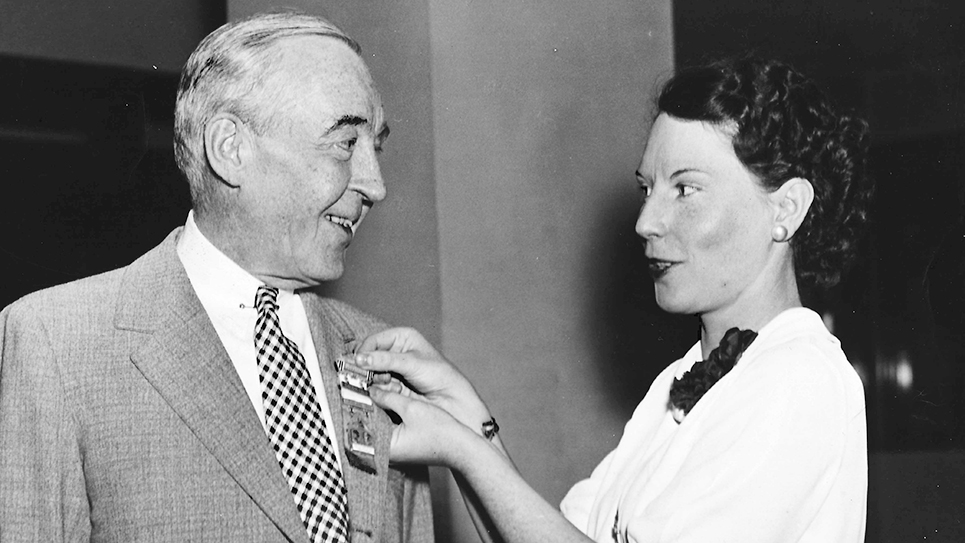By Ray Hill
Carroll Reece had first been elected to Congress from Tennessee’s First District in 1920 when he defeated Congressman Sam R. Sells inside the Republican primary. Sells had served for a decade before losing to Reece, who had been recognized for his bravery and heroism in the First World War. Reece had also served in Congress for ten years when he ran into political trouble due to his having sided with President Herbert Hoover on the question of public or private ownership of water power projects like Muscle Shoals, Alabama (the forerunner of the Tennessee Valley Authority). Hoover disdained the idea of public power, an idea which was popular with Tennesseans, both Democrats and Republicans. Tennessee’s senior U. S. senator, Kenneth McKellar, was an outspoken proponent of public power and an equally fierce opponent of the private power interests. Reece lost the 1930 general election to Oscar Byrd Lovette, who had been the district attorney general from a four county area surrounding Greene County. Lovette ran as an Independent and won after a whirlwind ten-day campaign. It was remarkable feat and was the first time in 52 years the First Congressional District had been represented in Congress by anything but a Republican.
B. Lovette had been a Republican his entire life and ran for reelection inside the GOP primary in 1932. Congressman Lovette lost narrowly and promptly refused to accept the results and ran in the general election once again as an Independent. Lovette might yet have won again had he faced Carroll Reece one-on-one. Albert Carter Tipton, a young attorney from a well known family, ran in the general election as the Democratic nominee. Young Tipton won some 7,000 odd votes while Carroll Reece tallied more than 30,000 ballots. Congressman O. B. Lovette won almost 28,000 votes.
Following the general election, Congressman J. E. Nelson of Maine conducted hearings on the alleged election irregularities in Tennessee’s First Congressional district at the behest of Congressman O. B. Lovette. Some of the testimony came from teenagers who stated they were paid a dollar to vote for Carroll Reece. The Chattanooga Daily Times reported Anna May Lewis, “a slender girl of 18,” told Congressman Nelson she had voted in the Republican primary that August. At that time, eighteen-year olds were not allowed to vote by law. “Sam Caylor got me to vote,” Anna May Lewis testified. “I told him I wasn’t old enough but he said it was all right. I went to the voting place in Tazewell and Elmer Arnold marked my ticket.
“John Greer gave me the ballot. I don’t know who Arnold marked it for. After that I went to a room at the back of Lawyer Davis’ office. Graham Welch was in the room and he gave me $1. Caylor had said I’d get $1 for voting.”
The “Davis” mentioned in Anna May Lewis’ testimony was William I. Davis, who was the campaign manager for Carroll Reece in Claiborne County.
Aseneth Moore gave testimony as well, telling Congressman Nelson, “Elmer Arnold and Sam Caylor got me to vote and said my age didn’t make any difference. Elmer Arnold took my ballot and marked it for me. He marked it for Carroll Reece. Caylor gave me a little blue card and I took it back to Mr. Davis’ office. Graham Welch gave me a dollar bill.”
Marie Moore said much the same thing. “Elmer Arnold put his finger on the ballot and told me to mark after the names.” Roy Myers, described as “a mountain youth, who said he was 16 years old” said, “Green Lynch paid me $1 for voting in the primary” in Tennessee’s Second District, which was represented by J. Will Taylor.
“Green Lynch came to me and asked if I wanted to vote and said he’d give me $1,” Roy Myers testified. “I said I didn’t think I was old enough and he said it didn’t matter. Ike Lynch gave me a ballot and didn’t ask my age. Green Lynch told me who to vote for.”
Lee D. Stone, a vice-president and cashier of the Citizen’s bank at New Tazewell, testified he had been approached by William I. Davis “some few days before the Nov. 8 election” to “get $1,000 in one dollar bills and $1,000 in half-dollars.” Stone said he got the money “from a correspondent bank in Knoxville about six days before the election.”
“Mr. Davis came the Saturday morning before the election and got the 1,000 one dollar bills and if I remember correctly 500 more. He didn’t get the halves.”
Congressman O. B. Lovette, who participated at the hearing of the House subcommittee headed by J. E. Nelson at the Claiborne County Courthouse, asked, “Was there anything said about the election?” “I don’t remember,” Stone replied.
Carroll Reece was present at the hearing as well, sitting quietly as the testimony was taken. It was all for naught and I recall the practice of dollar bills, as well as two dollar bills being used during local, state and federal elections during the 1960s. It was not unheard of in Tennessee politics; quite the contrary. In any event, it mattered little. John E. Nelson of Maine, like Oscar Byrd Lovette, had been defeated for reelection to Congress in the 1932 election.
Lovette doggedly refused to let the matter drop in a desperate effort to retain his seat in Congress, or at the very least, deny Carroll Reece the opportunity to return to the House of Representatives. O. B. Lovette continued to press the election contest before the House, insisting Reece had used enormous sums of money to win both the primary and general elections, as well as having been the beneficiary of voter fraud. There were an extraordinary number of challenges awaiting the action of the full House of Representatives following the 1932 election; there were eleven cases pending before the House.
Reece’s wealth was augmented by the death of his father-in-law, Guy Despard Goff, who had died January 7, 1933. The Knoxville Journal reported Louise Goff Reece, the wife of Carroll Reece, had inherited half of her late father’s “vast estate.” Goff’s widow, Anita, inherited one half of her husband’s estate “for her use during her lifetime.” The other half, according to the terms of Guy Goff’s will, was left in trust for Louise Goff Reece. According to the Journal, the Goff estate was “reported to be valued at more than $1,000,000” which consisted of “cash, valuable business property and other realty in West Virginia, stocks and bonds and personal property.” Among that “valuable business property” was the Waldo Hotel in Clarksburg, West Virginia, which had been Guy Goff’s official residence while serving in the United States Senate.
Senator Goff had not run for reelection in 1930 due to failing health. Like his son-in-law Carroll Reece, Goff had left Congress in 1931, albeit voluntarily.
After a two-year hiatus, Carroll Reece was returning to the U. S. House of Representatives. Washington, D. C. was quite different when Carroll Reece took the oath of office on March 3, 1933. During his previous decade of service, the Republican Party reigned supreme. Warren G. Harding, Calvin Coolidge and Herbert Hoover had occupied the White House throughout the decade of the 1920s; both Houses of Congress enjoyed GOP majorities. The Great Depression had soured the American people on Herbert Hoover and his political party. The 1932 election brought Franklin Delano Roosevelt and hope to the White House. With Roosevelt came a tidal wave that washed away many of the Republicans in Congress. Before the 1932 election, Republicans held a tenuous 48 – 47 majority in the United States Senate. Democrats won 11 seats in the 1932 election for a 58 – 37 majority in 1933. Prior to the 1932 election, Republicans had a scant 218 – 216 majority which dwindled due to the deaths of incumbents whose seats were won by Democrats in special elections, resulting in Democrat John Nance Garner of Texas being elected Speaker of the House. The results in the elections for seats in the House of Representatives gave Democrats a healthy majority; Democrats won 97 seats in the fall elections for a majority of 313 – 117. Carroll Reece returned to the nation’s Capitol to serve as a member of the loyal opposition rather than as a member of the majority party for the first time in his congressional career.
Republicans who occupied every federal office in the state of Tennessee – – – U. S attorneys, U. S. marshals, clerks of the federal courts – – – were about to be swept out of office and replaced by deserving Democrats. Congressman J. Will Taylor had appointed most of the federal officials in Tennessee, although Carroll Reece was responsible for a number of appointments. The 1932 election had changed the government of the United States fundamentally and the Republican officeholders were displaced.
However he had done it, Carroll Reece had accomplished a feat many had tried and yet failed in the attempt. It was not unusual, especially at that time, for a former congressman to run again – – – some repeatedly – – – to regain their seats in Congress. Most failed to be reelected. Carroll Reece proved to be an enduringly popular figure inside Tennessee’s First Congressional District and his political primacy would never again be successfully challenged amongst his people.
Perhaps one reason for Carroll Reece’s success inside the First District was his ability to change, as well as learn from his defeat. Reece never forgot why he had lost to Oscar B. Lovette in 1930; following his return to the House of Representatives, Carroll Reece became a supporter of the Tennessee Valley Authority. Reece frequently voted against the majority of his fellow Republicans, many of whom disliked the very notion of the TVA, to support the Tennessee Valley Authority. When asked why he didn’t go along with his party, Carroll Reece candidly replied no politician in Tennessee could survive politically by opposing the TVA. Reece had fought the bill sponsored by Senator George W. Norris of Nebraska, while Second District Congressman J. Will Taylor had supported it. Reece had lost his seat in Congress because of his opposition while the controversial Taylor had continued to hang on to his seat.
Carroll Reece took the oath of office once again as a Member of Congress and appointed Miss Beulah Deckert as his secretary. Miss Deckert had been the congressman’s secretary during his previous service in the House of Representatives and returned to Washington, D. C. in 1933. Miss Deckert had been occupied in Washington during the two years Reece was out of office by working in the newspaper business. Reece and Miss Deckert settled into temporary offices in the old House office building which would later be named for the late Speaker of the House Joe Cannon of Illinois. Congressman Reece and his staff would move to the “new” House office building the following week, which had yet to be occupied by congressmen and their staffs. That building would later be named for the late Speaker of the House Nicholas Longworth.
As the new Congress convened, Tennessee’s congressmen were active in the floor fight on what was known as the “economy measure”, which was objectionable to many because its failure to protect ex-servicemen from “drastic reductions in compensation.” Several members of Tennessee’s congressional delegation were themselves veterans of the First World War, including Carroll Reece. Two West Tennessee Democrats, Gordon Browning and Jere Cooper voted against the economy measure because it did not adequately protect veterans. So did the two Republicans from Tennessee, Carroll Reece and J. Will Taylor, along with two other Tennessee Democrats: J. Ridley Mitchell of Cookeville and Clarence W. Turner of Waverly. Only three Tennesseans in the House supported the Roosevelt administration by voting for the economy measure: E. H. Crump of Memphis, Joseph W. Byrns of Nashville and Sam McReynolds of Chattanooga.
Carrol Reece was back in Congress and would remain there for the next fourteen years.






